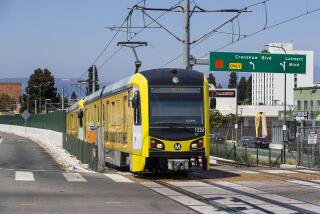Panel Tries to Persuade Studios They Can Live With Metro Rail
Noise and vibration from elevated Metro Rail trains proposed to run along Hollywood’s Sunset Boulevard can be controlled so that nearby recording and broadcast studios are not disturbed, a city-appointed panel of consultants reported Thursday.
Noise-reducing features in train cars, rails and track beds--coupled with sophisticated insulation of recording rooms along the route--should make it possible for vibration-sensitive studios to coexist with the passing trains, the panel said.
However, the consultants also found that there will be severe noise and shaking problems for the studios during the construction period that will disrupt their activities.
Studio representatives, some of whom have threatened to leave the city over the issue, said they disagreed with the panel’s main findings and vowed to intensify their drive to get the Sunset “el” route dropped.
“The ball will now come back to the City Council and the RTD,” said Councilman Michael Woo, who represents Hollywood and has been trying to delicately balance the concerns of the studios with the desires of other influential groups, including the Hollywood Chamber of Commerce, which have said Sunset is the best route. Woo, who has argued for the Sunset route in the past, declined to say what his stand is now.
The plan to run an elevated train down the center of one of the city’s most famous streets was approved earlier this year by the RTD board. It was part of a larger realignment of the Metro Rail route required to avoid underground methane gas in the Fairfax District.
The first leg of the commuter line in downtown Los Angeles, which is now under construction, will be a subway. But plans call for future extensions on Vermont Avenue and Sunset to be elevated, chiefly because of the high cost of subway building.
The Sunset Boulevard studios, claiming that they had no warning of the decision, began protesting several months ago, prompting Woo and Mayor Tom Bradley to name a panel of noise specialists to evaluate their concerns.
The panel’s report will be refined and presented to the City Council next week.
Generally, the studios, including television stations KTTV, KCBS, KTLA, radio stations KNX and KIIS and dozens of recording businesses, say the proposal comes at the worst possible time--when advancements such as digital recording are increasing the sensitivity of industry equipment to background noise and vibration. The start of construction of this section of the Metro Rail commuter line is expected sometime within the next 10 years.
Colin G. Gordon, an acoustical expert hired by the studios, told the panel that during the construction phase of the rail line the effects would be intolerable. “Many of them would be forced to move out. Once they do, they would not be inclined to come back,” he said.
Frederick Llewellyn, chairman of the panel, emphasized that the panel’s finding was based on the best information now available about the proposed project and that several key bits of information are not available--such as the precise design of the train cars and the track beds.
Much will depend on how well the train system is maintained once it is built, he said.
More to Read
Sign up for Essential California
The most important California stories and recommendations in your inbox every morning.
You may occasionally receive promotional content from the Los Angeles Times.










